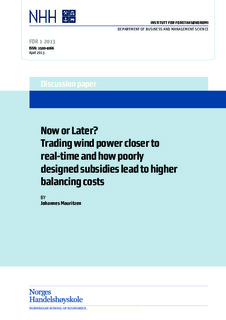| dc.contributor.author | Mauritzen, Johannes | |
| dc.date.accessioned | 2014-02-13T08:31:16Z | |
| dc.date.available | 2014-02-13T08:31:16Z | |
| dc.date.issued | 2013-04 | |
| dc.identifier.uri | http://hdl.handle.net/11250/164149 | |
| dc.description.abstract | An important challenge facing many deregulated electricity markets is dealing with the
increasing penetration of intermittent generation. Simulation studies have pointed to the
advantages of trading closer to real-time with large amounts of intermittent generation. Using
Danish data, I show that, as expected, shortfalls increase the probability of trade on the shortterm
market. But in the period between 2010 and 2012 surpluses are shown to decrease the
probability of trade. This unexpected result is likely explained by wind power policies that
discourages trading on Elbas and leads to unnecessarily high balancing costs. I use a rollingwindow
regression to support this claim. | no_NO |
| dc.language.iso | eng | no_NO |
| dc.publisher | Norwegian School of Economics and Business Administration | no_NO |
| dc.relation.ispartofseries | Discussion papers;2013/01 | |
| dc.title | Now or Later? Trading wind power closer to real-time and how poorly designed subsidies lead to higher balancing costs | no_NO |
| dc.type | Working paper | no_NO |
| dc.subject.nsi | VDP::Social science: 200::Economics: 210::Business: 213 | no_NO |
